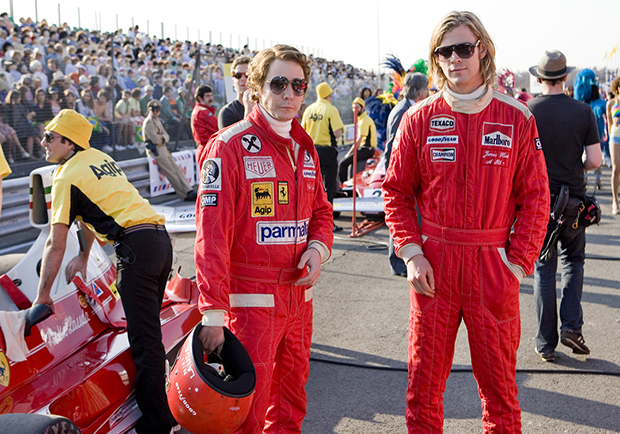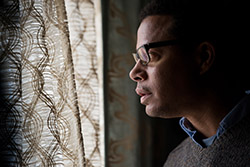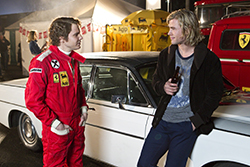Denis Villeneuve's Prisoners begins with a foreboding prologue in which we heard the Lord's Prayer as suburban dad Keller Dover (Hugh Jackman) helps his teenage son track and shoot a deer from a distance. Photographed with quiet, slow zooms and a wintry ambience (cinematographer Roger Deakins has never been better), this cryptic scene sets the tone for the tense, contemplative, and oddly beautiful 150 minutes that follow in what is one of the year's most surprising films.
Rife with biblical allusions and ostensibly grounded in an old fashioned exploration of good vs. evil, Prisoners is more than just your standard kidnapping thriller. It explores the existence of evil, but not in the ghoulish abstract. Nor does it simply give the audience a jolt (which it does, expertly). Rather, it forces us to think about evil's complexity and everyday-ness—particularly the way it can grow and spread once it takes root, like the trees so eerily and intentionally present in so many of the film's frames.
 Wilson Webb / Alcon Entertainment
Wilson Webb / Alcon EntertainmentThe film's exploration of goodness and badness begins on Thanksgiving as Keller and Grace Drover (Jackman and Maria Bello) celebrate with their friends the Birches (Viola Davis and Terrence Howard), along with both couples' kids. The warmth, smiles and laughter of these early scenes doesn't last long. When the families' two young daughters go missing later in the afternoon, after going outside to play, darkness descends and a cold, wet, bleak battle with evil ensues. A local detective (Jake Gyllenhaal) arrives on the scene and attempts to unravel the mystery of the girls' disappearance. A mysterious man with a mental handicap (Paul Dano) becomes a person of interest. With every day that passes without finding the girls, the Dovers and Birches become increasingly desperate.
In the spirit of David Fincher's Zodiac (which also starred Gyllenhaal as a detective who becomes obsessed with solving the case), Prisoners is a labyrinth of a crime procedural, full of dead-ends, false leads, and an abundance of creepy maybe-villains and dark basements. Also like Zodiac, Prisoners amplifies the unease through a pacing and visual style that goes against many conventions of the genre. Slower and less relentless in its violence than most of today's thrillers, Prisoners lends itself to contemplation as readily as it does armchair sleuthing.
And lest it sound too cerebral or highbrow, be assured: it's also a white-knuckle experience from start to finish.
Prisoners is about imprisonment on a number of levels. First, the literal sense: in addition to the young kidnapping victims around which the plot revolves, at least four other major characters find themselves imprisoned at various points in the film. The physical imprisonment of one character in the film's genius final shot is especially jarring.
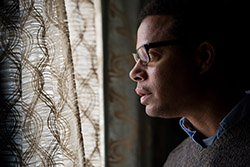 Wilson Webb / Alcon Entertainment
Wilson Webb / Alcon EntertainmentBut the film is also about how we are prisoners in other ways: prisoners to our notion of happiness; prisoners to our job or cause (see Gyllenhaal's Detective Loki); prisoners to our need for retributive justice and—perhaps most importantly—prisoners to our own guilt and shame.
The film suggests that, in a sense, human existence is one big imprisonment. We're constantly locking up our depravity and protecting ourselves from ourselves. We try to keep our more sordid tendencies hidden and our propensity for evil at bay. But this is easier said than done. In one sequence, snakes escape from formerly locked-tight containers—and similarly, evil is always desperate to break free and roam wild. It wants to infect the good. Part of the power of Prisoners is that it depicts the insidious tactics of evil in a manner that feels utterly close to home. It's not just about big, bad, nightmarish villains. It's about the little ways that all of us get infected.
Villeneuve's probing of these matters might feel on the nose in a lesser film, with lesser collaborators and with lesser actors. But everything is top-notch here, and (most of the time) subtlety wins the day. Jackman is powerful as a father whose protective instincts and grief-fueled rage threaten to undermine his own grasp of goodness. Gyllenhaal is also impressive in a role that is written rather flatly but which ends up being one of the film's most curious. The rest of the cast, including the formidable Viola Davis and Terrence Howard, makes much of underwritten roles.
One of the motifs in Prisoners (which you will know from even the trailer and film's poster) is the maze. The film's narrative is a maze, and its philosophical approach is, too. Is evil ever truly escapable? Is there a way out of the labyrinth?
The film's bleak, if not nihilistic, answer seems to lean toward the negative. Yes, there is goodness in the world. And some characters emerge relatively unscathed, when all is said and done. But if the film has a central point, it seems to be that evil touches all: one person's evil ripples out into other lives for generations on. Families, communities, and nations are infected by sin, manifested in horrific shooting rampages and serial killings, but also in fuzzier compromises like "for-the-greater-good" torture (an issue raised rather pointedly by Prisoners).
Films like Prisoners that are real and sober about sin are a rarity in contemporary cinema. Indeed, most films, like Ron Howard's latest—Rush—would prefer to call sin "vice" and celebrate it as the funny-sad bad boy exploits of a colorful character.
This is not all of what Rush is about, but it plays a big part. The based-on-a-true-story film is about the sex, booze, drugs and high-speed danger of 1970s Formula One racing. It's about legends like James Hunt (Chris Hemsworth), the ultimate embodiment of "live fast, die young" extremism whose playboy image and womanizing ways (he reportedly slept with more than 5,000 women in his lifetime) were consistent with his risky rep on the racetrack.
If Prisoners is about characters trying to protect both their loved ones and themselves from the dangers of sin (both external and internal), Rush is about the thrill of flirting with darkness; or if not darkness, then at least death. For the drivers in Rush, self-preservation is the real enemy; it gets in the way of success on the racetrack, which requires a certain measure of reckless abandon. As one driver remarks in the film when he gets married: "Happiness is the enemy. It weakens you. Suddenly you have something to lose."
It's not surprising, then, that a person like James Hunt—a born competitor whose passion for winning races trumps everything—winds up being such a sad character. On the surface he's living it up (cocaine, marijuana, buckets of alcohol pre-and-post-race, and multiple women in his bedroom at all times). But he's clearly kept real happiness and commitment purposefully at bay. Emotional detachment makes him a better racer because, like all of his vices, it's all about momentary pleasure, not consequence.
 Jaap Buitendijk / Universal Pictures
Jaap Buitendijk / Universal PicturesThankfully Rush is not just about James Hunt. The film is about Hunt's 1976 rivalry with Austrian driver Niki Lauda (Daniel Brühl), who is refreshingly opposite of Hunt in nearly every respect other than driving really fast. Lauda, unlike Hunt, is disciplined and focused on the mechanics, probabilities, and percentages of racing, more than the rush of its recklessness and danger. Indeed, Lauda's ultimate willingness to assess personal risk makes it harder for him to compete with the fearless Hunt. Morally and professionally, Lauda is the more admirable of the duo, but not necessarily the one you root for. Hemsworth's Hunt is more charismatic and likable, even if you aren't surprised or too sad to find out that he died from a heart attack at age 45.
Rush has a few things going for it. It's a sports movie about a relatively niche sport, featuring a compelling episode involving two of its noteworthy icons duking it out on the Grand Prix circuit. It's an amusingly rendered period piece. It has high octane racing scenes and very loud, fast Ferraris—if you're into that sort of thing. It's imbued with Ron Howard warm fuzzies, but not too much (somewhere in the register of Cinderella Man). It has some cool slow-mo shots of rain.
But as enjoyable as Rush sometimes is, the film never packs a punch or provokes a thought that lingers longer than one of Hunt's pre-game conquests. In the end it's a fairly standard, mildly entertaining sports movie that led me to spend a few minutes on Wikipedia reading about Hunt, Lauda, and Formula One.
It's a bit of a missed opportunity. For while the Lauda-Hunt dynamic has its moments of Hegelian insight and frenemy fun, the film only vaguely explores the implications of their divergent approaches to life (though you might wonder if they are really as divergent as the film depicts). Hunt's character in particular feels more complex than he's portrayed. What fuels the recklessness and addition to risk in a person like that? What in his past led him to treat himself (and others, particularly women) as something more akin to a car part than a human being?
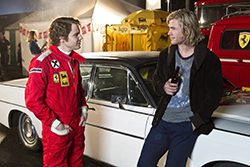 Jaap Buitendijk / Universal Pictures
Jaap Buitendijk / Universal PicturesRush doesn't seem as interested in these deeper character questions as it does with the revving of engines and the choreography of race scenes. Still, it's a smarter-than-average sports movie and one that offers the viewer (particularly car lovers) the sort of wheel-screeching cinematic blast its title promises. Just don't expect to get too much long-term mileage out of it.
Caveat Spectator
Both Prisoners and Rush are rated R. Prisoners receives its rating because of strong language and intense violence. Though the violence is not ubiquitous and isn't gratuitously graphic, there are a few sequences of torture that are hard to watch. The film's general ambience of dread and darkness, and subject matter of child kidnapping, make it a highly questionable film to show to children.
Rush has a more lighthearted tone but also has a few scenes of disturbing violence (a few fiery crash scenes resulting in mangled limbs, facial burn scarring and other injuries). Rush also has a few scenes of sex and nudity (both female and male) as well as lots of depictions of drug and alcohol use. Neither of these films is appropriate for children and should be approached with caution by all.
Brett McCracken is a Los Angeles-based writer and journalist, and author of the books Hipster Christianity: When Church and Cool Collide (Baker, 2010) and Gray Matters: Navigating the Space Between Legalism and Liberty(Baker, 2013). You can follow him @brettmccracken.

